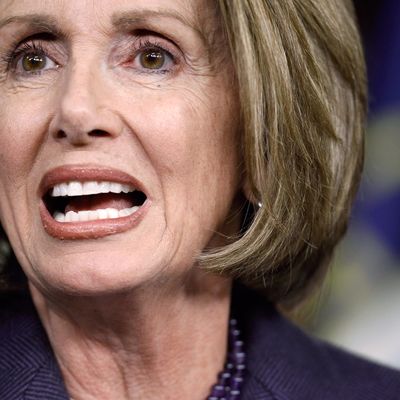
Yesterday, Greg Sargent asked Nancy Pelosi about the prospect of raising the Medicare retirement age. Pelosi chooses her words very, very carefully, so read her answer very, very carefully:
>“I am very much against that, and I think most of my members are,” Pelosi said in an interview with me today. “I don’t see any reason why that should be in any agreement.” …
She also said flatly that she didn’t believe raising the eligibility age would be in the final deal, despite GOP demands: “I don’t anticipate that it will be in it.”
The issue isn’t whether Pelosi wants to raise the Medicare retirement age — of course she doesn’t. The question is whether that provision would make her sink any deal. There are words you use to signal such a position — deal-breaker, red line, unacceptable, and so on. She didn’t use any of those terms. Sargent headlined the item “Pelosi: Dems must say No to raising Medicare eligibility age,” but all those answers seemed to tell us is that, all things being equal, she’d rather not raise the Medicare retirement age.
This seems like a useful time for liberals to sort out the difference between budget ideas we don’t like and budget ideas we can’t or shouldn’t accept. (Ezra Klein has some other sensible ideas here.) Many of my liberal wonk friends have been making the case against raising the Medicare retirement age — see Sarah Kliff, Matthew Yglesias, and Jonathan Cohn. Their basic case is that raising the Medicare retirement age is a really stupid way to save money because it just forces people to stop buying health care through Medicare, which is relatively cheap, and start buying it through private insurance, which costs way more.
They’re all totally right about this. Still, when the question comes to what concessions the Democrats are going to have to accept, rather than what policy makes the most sense, raising the Medicare age seems like a sensible bone to throw the right. For one thing, it has weirdly disproportionate symbolic power, both among Republicans in Congress and establishmentarian fiscal scolds. Mitch McConnell and Erskine Bowles alike would regard raising the retirement age as a sign of serious belt-tightening and the “structural reforms” conservatives say they need. Meager and inefficient though the savings may be, they pack a lot of punch in delivering Republican votes.
What’s more, raising the Medicare retirement age would help strengthen the fight to preserve the Affordable Care Act. Republicans may be coming to grips with their lack of leverage over the Bush tax cuts, but their jihad against universal health insurance lives on. Having narrowly lost their wildly tendentious legal argument for striking down health care, they are devising newer and even more implausible ones. Republican governors continue to turn down federal funding to cover their poorest uninsured citizens and refuse to set up private insurance exchanges.
The political basis for the right’s opposition to universal health insurance has always been that the uninsured are politically disorganized and weak. But a side effect of raising the Medicare retirement age would be that a large cohort of 65- and 66-year-olds would suddenly find themselves needing the Affordable Care Act to buy their health insurance. Which is to say, Republicans attacking the Affordable Care Act would no longer be attacking the usual band of very poor or desperate people they can afford to ignore but a significant chunk of middle-class voters who have grown accustomed to the assumption that they will be able to afford health care. Strengthening the political coalition for universal coverage seems like a helpful side benefit — possibly even one conservatives come to regret, and liberals, to feel relief they accepted.






























